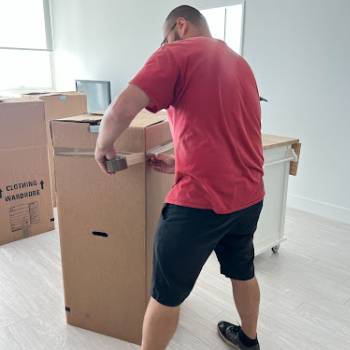There’s no need to fret about moving to a new apartment because we’ve listed all the important steps to guide you through this major transition in your life.
If you’re seeing yourself moving to a new apartment, especially if it’s your first leased or owned apartment in your life, well, congratulations to you! Moving to your own space is always an exciting time, especially if you move into a vibrant metropolitan such as San Francisco or San Diego.
Admittedly, planning for a major move can be quite daunting already as there are so many things to consider, from packing to loading to unloading to unpacking and finally to disposing of packing materials.
Apartment moving is an even more daunting task considering that there are a host of guidelines for you to follow through with the building’s management and other logistical challenges, compared to moving to your own home, wherein you only need to worry about your own property.
As the best moving company in San Francisco and the greater Bay Area, we at SF Bay Area Moving want to share with you all the important tips we’ve picked up on throughout the many years we’ve helped Californians who moved to new apartments. We understand that moving to any new place takes a lot of time and effort to plan, that’s why we want to take away the guesswork on what (and what not) to do so you can ease into your new space minus the stress and the jitters.
Comprehensive Apartment Moving Checklist
2 Months Before Your Big Move
- Make sure to confirm with your landlord or building supervisor the date that you choose for moving in and ask them if there are any moving-in permits you need to sign ahead.
- If you’re moving out of a current apartment or any other rented home, give courtesy to your current landlord by letting them know of your plans to move out so they can also have ample time to advertise rental of the space you’re leaving. Likewise, ask them if there are any moving-out permits you need to sign ahead.
- If you have access to your new apartment already, ask the landlord if you could drop by one day to take measurements of the space. This will help you determine if there are certain pieces of furniture in your current place that you cannot bring with you anymore because of the spatial constrictions.
- Research the best moving companies in your locale and make sure to read their customer reviews on Yelp, Google My Business, and other apps so you’ll be better informed of the quality of their services. Compare their respective rates and specific services, and most important of all – ask them if they are licensed, bonded, and insured.
- If you’ve selected a moving day that happens to be on a weekday, the sooner you request for a personal time off from work from your boss, the better.
- Do a mental inventory of all the belongings you would like to take with you to your new place. If you have a lot of things that you’d rather not bring, consider donating these to an organization such as Goodwill, or if you prefer, reselling them online or at a flea market.
- Make a budget for all moving expenses, which should include costs for the following: packing materials such as boxes, bubble wrap, and tape; labor costs and tips for the movers; gasoline, tolls, and parking fees; moving insurance; and petty cash for any miscellaneous expenses.

One Month Before Your Big Move
- Once you’ve done your research, hire the local moving company that feels right for you. See to it that you relay to them all information that they’ll need, like for instance, if they need to stop by a storage unit on the way to your new place, or if you have something cumbersome to disassemble like a Peloton bike.
- Before signing any contracts with your selected moving company, make sure to read everything, especially the fine print. (We can’t highlight this enough!)
- Do a thorough inspection of your current apartment or home to see if you might have left any sort of damage or disrepair. And if there are, like perhaps a portion of ripped off paint on the walls, or a broken faucet, make sure to have these fixed before moving out.
- Check with your new landlord or building supervisor if your moving truck can park right in front of your new apartment and what city permits and such you might need to fill out so you can be permitted to move on your chosen date.
- If you opt to self-pack all your belongings, or at the very least, the smaller items, then start packing whatever you can day by day. Make sure to categorize your stuff per function and label everything!
- If your utility accounts (water, power, gas, internet) are in your name directly, do not forget to contact your utility companies and inform them of your pending move so they can either cancel outright your account or make a change in your billing address.
- And speaking of a change in your billing address, ascertain to it that you also inform the following persons, companies, and government agencies as to where they can now reach you moving forward:
- your bank and credit card providers;
- your accountant and/or lawyer;
- the DMV so you can process a new driver’s license;
- the HR department at your workplace;
- and believe it or not, the USPS, so the new tenants that will take over your current place won’t be pestered with mails and parcels addressed to you.
The Week Of Your Big Move
- When you’ve pretty much emptied out your current space, be courteous enough to clean it, which is also a good way to do one last walk through of your place to make sure you won’t leave anything behind.
- Pack a small day bag that’s easy to carry around with a change of clothes good for a few days, toiletries, and other personal effects that you will need during the move out/move in process.
- If your current refrigerator is also moving with you to your new apartment, make sure to empty it out at least 48 hours before the day of the big move so that the movers will no longer need to worry about spills and spoilage from what’s inside the ref.
- Look up what restaurants, pharmacies, grocery shops, and convenience stores are within a 2-mile radius of your new location so that you can easily get food and other quick needs during the move.
- Get a hold of a locksmith in your new locale if ever you need to change or install additional locks in your apartment.
- Contact your moving company and just reconfirm with them that your scheduled moving date is already near.
The Day Of Your Big Move
- We highly recommend that you stay behind your current place as your movers are doing all the last minute packing so you can monitor what items are going in which boxes and such. Also, stay behind while they load the truck.
- Do one last walk through of your old space and make sure that everything is locked & the keys are turned over properly to the right person in charge.
- Head out to your new apartment ahead of the movers so that you can supervise them when they park, unload, and move the boxes and items around. If they are also staying over to help you unpack, see to it that all the packing materials are properly disposed of.
- Ask your new landlord or building supervisor to tour you around the building and show you where your water and electric meters are and where your unit’s circuit breaker can be located.
- Once everything is finished, catch your breath and maybe explore your new neighborhood so you can get yourself something good to eat.
If you’re looking for the top local mover in San Francisco or the Bay Area, we offer you the best moving services in the entire Golden State. Whether you are apartment moving to a nearby city or to the farthest end of the state, we at SF Bay Area Moving can offer you the highest quality moving services that are customer-friendly with safety guaranteed.




